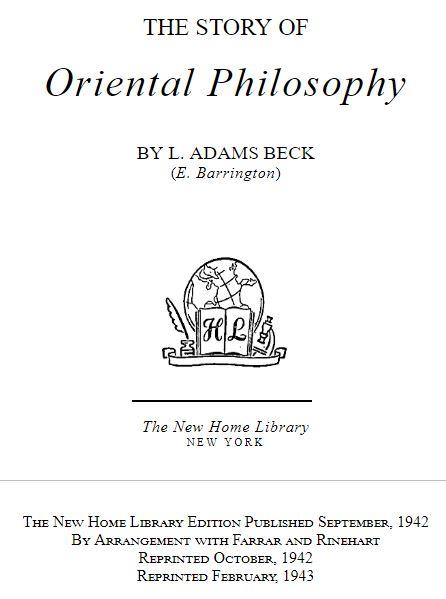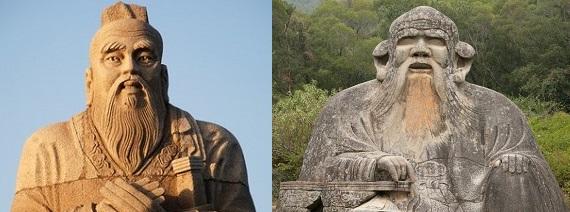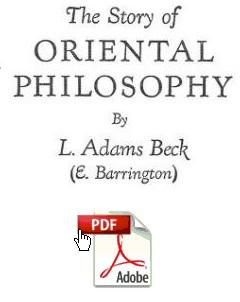

Chapter XXVI
CHUANG TSU HIS IRONY AND HUMOR

SAYS Chuang Tsu: Confucius went to the West to deposit his writings in the library of the Imperial House of Chao, and Tsu Lu counseled him, saying:
“I have heard that the officer in charge was one named Lao Tsu, who has resigned his office and lives privately. As you, master, wish to deposit your works, why not go and gain his help? “
Confucius said, “Good”, and went to see Lao Tsu, who refused his assistance, whereupon the other began to give a summary of Spring and Autumn with the view of convincing Lao Tsu. But Lao Tsu interrupted:
“This is all nonsense. What are your fundamentals? “
“Charity”, replied Confucius, and duty to one s neighbor.
Said Lao Tsu: “And do you think charity and righteousness constitute man’s original nature?”
“I do. Without charity the princely man could not be what he is. Without righteousness he would be of no effect. These two belong to the original nature of the superior man.”
Lao Tsu continued:
“Tell me what you mean by charity and righteousness?”
Confucius answered:
“To be in one s inmost heart in sympathy with all things, to love all men without selfishness this is the characteristic of charity and duty to one s neighbor.”
Lao Tsu exclaimed:
“What stuff! Does not universal love contradict itself? Is not your elimination of self a positive manifestation of self?”
[Meaning that if everyone loves everyone there is nothing to set forth love as love no background against which it can be perceived. In the same way absolute unselfishness awakens absolute selfishness as a necessary result of its practice. It must be owned that Confucius is in a difficulty here! He does not answer, and Lao Tsu goes on triumphant:]
Sir, “if you would cause the empire to be rightly nourished, think of heaven and earth, which go their way undeflected! Think of birds and of beasts, who collect in their dens, and of trees and shrubs, which grow upright without deviation. Be like these. Follow the Law and you will reach your end. Why must you make such a pother about charity and duty to one s neighbor as though beating a drum for the hue and cry after a fugitive? Alas, master, you have brought much confusion into the mind of men!”
Some dispute that this conversation is from the hand of Chuang Tsu, possibly because they are surprised to find him allowing Confucius his own opinions, if even for the purpose of putting them to flight; and yet it may very well be a part of the actual discourse which took place at the meeting in Lo.
The story of Confucius and Robber Chi that I give now is certainly spurious in that it was not written by Chuang Tsu; but it is so well written, so entirely in the manner of his philosophic stories, and it so perfectly illustrates a favorite point of his that it was long supposed to be his; and I think this a highly appropriate place for such an ancient and valuable effort in the art of transcendental philosophy. I give it condensed as follows:
Robber Chi had nine thousand followers. He ravaged the empire, plundering nobles and people. He lifted cattle. He stole women. Family ties were nothing to his greed. He had no respect for parents or brothers and neglected ancestor worship. Where he passed the greater states flew to arms, the smaller to refuge.
Said Confucius to the elder brother of Robber Chi:
“An elder brother should admonish his junior. If it is not so, there is an end to the value of these relationships. Now you, sir, are one of the scholars of the age, and your brother is Robber Chi. I blush for you. Let me go and exhort him on your behalf.”
“As to what you say, sir“, replied the brother, “if the junior won’t listen to his elder brother, what becomes of your argument? Besides Chi’s passions are like a whirlwind. He can argue until wrong becomes right. He is free with abuse. Keep away from him! I strongly advise you.”
Confucius paid no attention but with Yen Hui [his favorite disciple] for charioteer and Tsu Kung [a famous follower] on his left, went to Robber Chi. The robber was engaged in devouring a dish of minced human liver; Confucius alighted and addressed the doorkeeper.
“I am Confucius of Lu state. The high character of your captain has reached me.”
He then twice respectfully saluted the doorkeeper, who went in to announce him. When Robber Chi heard the name he was furious. His eyes glared like stars. His hair raised his cap.
“What? that crafty scoundrel Confucius of Lu? Go, tell him he is a mere word-spinner! That he talks nonsense about the ancients. That he wears an extravagant cap with a thong from a dead ox. That his lips patter, and his tongue wags, and he throws dust in the eyes of rulers and prevents scholars from reverting to the original Way. That he makes a great stir about filial piety, glad enough himself to secure some fat fief or post. Tell him if he does not take himself off, his liver shall be in my morning stew!”
Still Confucius repeated his wish, burning to evangelize the offender.
“I am anxious to set eyes upon your captain’s shoe-strings.” (A polite form of address.)
He was admitted and hurried in, avoiding the place of honor and making two obeisances.
Robber Chi, flaming with fury, straddled out his two legs, laying his hand on his sword, and roaring like a tigress with young, said:
“Come here! If what you say suits me you shall live. Otherwise you shall die.”
“I have heard,” said Confucius, “that there are three sorts of virtue. To be tall and beautiful and thus the idol of all. To be possessed of all-embracing wisdom. To be possessed of valor. A man with any one of those may rule, but you, captain, unite all three. You are stately in stature. Your expression is radiant. Your lips are vermilion, your teeth like a row of shells. Your voice is sonorous as a beautiful bell. Yet you are known as Robber Chi! Captain, I blush for you! If you listen to me I will go south, north, east, and west for you. I will have a great wall built for you many li in length, enclosing a state which you shall rule. You shall disband your men, gather your kin about you and join in the worship of your ancestors. Such is the behavior of the true sage, and such is what the world needs.”
“You come here with offers!” cried Chi in a rage royal. “Those who are squared by offers and corrected by preaching are the stupid, vulgar masses. The height and beauty you praise, my parents gave me; and do you suppose I am not well aware of them? All you promise about this fine state is simply squaring me, as though I were one of the common herd. And of course it would not last.”
“Even with the empire and the heroes of old their posterity reigns no longer. In the olden days men lay down without caring where they were, and got up without worry as to where they would go. A man knew his mother but not his father. He lived among the animals, tilling the ground for good. He wove cloth to cover himself. He had no thought of injury to others. These were the results of an age of virtue. Since then we have had nothing but disturbers of the peace.
And now you come along, preaching the old dogmas and palming off sophistries to teach posterity; you wear patched clothes and talk big and act falsely, while all the time you yourself are aiming at wealth and power! You are the biggest thief I know; and if men call me Robber Chi they should certainly call you Robber Chiu” [the personal name of Confucius].
“As to the sermon you propose for me if it is on spiritual subjects they are beyond me, and if on human affairs, I know it already. Now I ll tell you a few things!”
“The lust of the eye is for beauty, the lust of the ear for music, the lust of the palate for flavor, the lust of ambition for power. Man’s greatest age is a hundred years. A medium age is eighty. The lowest estimate is sixty. Subtract the hours of sickness, death, mourning, and trouble, and there remain no more than four or five days a month in which a man can laugh. Heaven and earth are eternal; man must die. Seen against the Eternal, the mortal is a mere flash, like the passage of a white horse seen through a crack. And those who cannot gratify their ambition and live through their span in doing so, are men who have not attained the Law.”
“All four teachings are nothing to me. Go home! Say no more. Your doctrine is full of falsity. It can never preserve the original purity of man.”
Confucius made two obeisances and hurried off. As he rode in his chariot he sometimes dropped the reins. His eyes were so dazed he could see nothing. His face was the color of slaked lime. With downcast head he grasped the bar of his chariot. Arrived outside the eastern gate of Lu, he met the brother of Robber Chi, who said:
“I have not seen you for some days. From the look of your chariot I guess you have been traveling. Can you have been to see Chi? “
Confucius looked up to heaven and sighed. I have!
“And did he not rebuff you as I said he would?”
“He did!”, said Confucius.
“I am a man who has cauterized himself without being ill. I hurried away to stroke the tiger’s head and cut his whiskers and I nearly fell into his jaws.“

The Story of Oriental Philosophy – Lily Adams Beck
Chuang Tzu, Confucious and Adi Da in ‘The Way’
